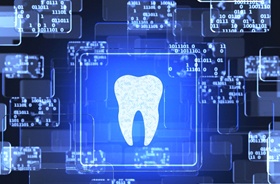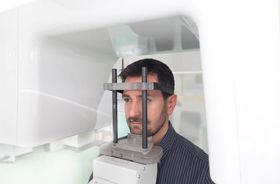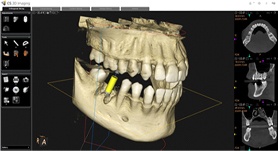
Dental Implants – New Haven, CT
State-of-the-Art Smile Repair
Your teeth are extremely strong not just because of the enamel, but also due to the fact that they are rooted in your jawbone, which provides a sturdy foundation. When one goes missing, most replacements only bring back the part of the tooth you can see, which inherently makes them much less stable and reliable. Dental implants, on the other hand, bring back both the crown and the root, creating something that is the next best thing to nature. At New Haven Dental Group, we can fill in any gaps in your smile using this one-of-a-kind solution, and unlike other dental offices, we’ll be able to provide everything you need in one convenient location.
Why Choose New Haven Dental Group
for Dental Implants?
- All-inclusive dental implant care
- Porcelain restorations designed just for you
- Able to replace any number of teeth for a lifetime
Benefits of Dental Implants
- Security: Dental implants consist of a small titanium post that is placed into the jawbone that mimics a tooth root, and this is used to support a restoration seen within the smile. Because the new teeth are rooted within the strong bone, patients don’t have to worry about them moving around no matter what they are eating.
- Aesthetics: Implants are built just like natural teeth, which means they look just like real teeth as well. Only you and your dentist will know which teeth aren’t your own!
- Bone Loss Protection: The jawbone relies on the roots of the teeth for support, and without them, it will slowly shrink and atrophy as time goes by. Implants are the only treatment that can prevent and even reverse this process, which helps maintain the health of the bone as well as the shape of the face.
- Longevity: With routine oral hygiene, a dental implant can often last for 30 years or more.
Learn More About Benefits of Dental Implants
Who Dental Implants Can Help

No matter how many teeth you are missing, dental implants may be a viable option. They can replace one tooth, a few teeth, and even a mouth full of teeth. When you visit us for your consultation, we will evaluate your needs, determine whether you are a candidate for dental implants, and design your custom treatment plan. We offer numerous types of lifelike restorations that can fill in the gaps in your smile and help you enjoy a strong, reliable set of teeth.
Who Is a Good Candidate for Dental Implants?

The vast majority of adults with missing teeth are candidates for dental implants, either right away or following some preliminary treatments. Here are a few criteria that you should meet before your dental implant dentist in New Haven is likely to approve you for the procedure:
- Fair overall health. You should be well enough to undergo minor surgery. Conditions like uncontrolled diabetes or severe immune disorders will need to be well-managed before your procedure.
- Good oral health. It is important that you are free of active gum disease. Gum disease can affect the tissue around dental implants and drastically increase their risk of failure.
- A strong jawbone. Your jawbone must be strong enough and thick enough to support your dental implants. If it is not currently, it may become so after a bone graft procedure.
Missing 1 Tooth

If you are missing a single tooth, we will insert a single dental implant into your jawbone. After it has had adequate time to bond with the surrounding tissue, we will design a custom crown to go on top of it. Implant-supported crowns are superior to traditional bridges because they stimulate the jawbone and usually do not require that any of the nearby teeth be modified. Plus, because implants imitate the structure of natural teeth, they offer remarkable feel and function.
Missing Multiple Teeth

If your missing teeth are in a row, we will likely recommend an implant-supported dental bridge. A bridge that replaces two teeth may need just one implant to support it. If you have three or more missing teeth, you may need two dental implants. One will go at each end of the gap, and they can replace up to five consecutive missing teeth.
What if your missing teeth are not adjacent? Multiple single-tooth implants or an implant-supported partial denture may be the best solution for you. A partial denture can replace multiple teeth at different places throughout a dental arch with as few implants as possible.
Missing All Teeth

An implant denture is usually the best solution for individuals who have lost all of their teeth throughout an arch. There are different types of implant dentures, including removable ones that require the support of just two or three dental implants, as well as permanent ones that are supported by 4 – 6 or more dental implants. We will carefully evaluate your needs and circumstances before we recommend the type of restoration that we believe is the best fit for you.
The 4 Step Dental Implant Process

The dental implant process takes place across several months and requires multiple treatment stages. While it does require a significant amount of time, the end result is well worth it! Our team of dentists and specialists will be with you through every step of your journey, including your implant placement surgery and restoration.
Exactly how dental implants work in New Haven varies from case to case, but it generally involves four major steps: the initial consultation, the implant placement surgery, osseointegration and abutment placement, and restoration.
Initial Dental Implant Consultation

Your implant dentist in New Haven will thoroughly examine your oral health and review your medical history. They may also order some X-Rays so they can view the area beneath your gumline. Then, they will be able to let you know if you are a candidate for dental implants. If you are not currently eligible, you may become so after some preliminary treatments, such as tooth extractions, a bone graft, or gum disease therapy. Once your mouth is ready, our team can begin to plan the rest of your dental implant treatment. Feel free to ask questions during your consultation — we want our patients to be well-informed!
Dental Implant Surgery

Some practices must refer patients to an outside specialist for this part of dental implant treatment. But at New Haven Dental, we have an expansive team that includes specialists who are more than capable of performing the surgery right here in our office. This makes the patient experience more efficient, and in many cases, less expensive.
During the procedure, we numb your mouth and may sedate you. Then, your dentist will create incisions in your gums before inserting your implants into your jawbone. After the incisions are closed, you can go home to begin your recovery. Most patients are able to return to work within a day or two of their procedure.
Dental Implant Osseointegration & Abutment Placement

Following your implant placement surgery, osseointegration will begin. This is the biological process through which your bone tissue will fuse with your dental implants, enabling them to serve as sturdy prosthetic tooth roots. Osseointegration usually takes at least 3 or 4 months, but in some cases, it takes longer.
After adequate osseointegration has occurred, you might need to undergo a second minor surgery. Your implants will be exposed, and healing caps will be placed on them. Later, you will receive abutments. Abutments are small connector pieces that secure restorations in place. (Some patients receive abutments at the same time as their implant placement surgery.)
Delivery of Dental Implant Restorations

During this final stage of your treatment process, we will design a crown, bridge, or denture to go on top of your dental implants in New Haven. The size, shape, and color of your restoration will all be tailored to work with your unique facial features and oral anatomy. After a dental laboratory fabricates the restoration, we will verify its fit before we secure it in place. Then, you can go and begin to enjoy your beautiful, strong new smile!
Dental Implant Post-Op Instructions

After your dental implant placement surgery, you will have to go through a recovery period. But there is no need to worry. Below, we outline what you can expect while your mouth is on the mend. We also provide some practical dental implant post-op instructions in New Haven to help you be as comfortable as possible.
What to Do Directly After Dental Implant Surgery

Blood clots should form at your surgical sites. They are an important part of your body’s healing process, so you should avoid doing anything that might disturb them. To protect your blood clots, you should avoid tobacco usage and drinking straws. It is also important that you do not spit; instead, use tissues or simply swallow excess saliva. Do your best not to touch your surgical sites with your fingers or tongue.
Common Side Effects

During the first few days of your recovery, you might experience the following:
- Intermittent bleeding. This can go on for several days. It should be manageable with gauze and light pressure.
- This can last anywhere from 3 days to a week or longer. Cold compresses may help to keep it to a minimum.
- General discomfort. A pain medication can help you to take the edge off of any discomfort. It is also important that you get enough rest.
If you experience any severe or unusual side effects, let your dental implant dentist in New Haven know right away.
Diet

At first, you should stick to a no-chew diet, which can include things like yogurt, applesauce, smoothies, and pudding. Later, you can graduate to a fork-tender diet, which means you can enjoy soft foods like meatloaf, scrambled eggs, and non-crusty breads. After the soft tissue in your mouth is well-healed, you may eat a fairly normal diet (if you still have enough natural teeth left to adequately chew your food). However, you should continue to be cautious with crunchy and hard foods.
Oral Hygiene

You can brush your teeth starting the day after surgery, but exercise extreme caution around your surgical sites. Rinsing your mouth a few times a day with warm saltwater can fight bacteria and help to manage swelling. If you have a prescription mouthwash, use it as directed. If you choose to use a nonprescription mouthwash, it would be wise to choose a product without a high alcohol content.
What to Do After Your New Teeth Are Attached

Once your restorations are attached to your dental implants in New Haven, you might experience some temporary gum sensitivity. However, you should not notice any swelling or bleeding. You can use your new teeth right away, but it would be best to eat soft foods while you adjust to how they feel in your mouth.
Dental Implant Technology

Successful dental implant treatment depends on more than just a dental team’s skill and experience. It also hinges on the tools they have available to them. We fully understand that, so we have invested in advanced dental implant technology in New Haven. Our innovative instruments contribute to predictable, efficient, and comfortable treatment from beginning to end. Read the information below to learn a bit more about the specific types of technology that we use in our practice.
3D Cone Beam Imaging

We often use regular digital X-Rays to get a view of what is happening beneath a patient’s gumline. While such images are vital for routine checkups, they do have their limitations. They do not provide the high level of detail that is required to plan dental implant treatment and other complex procedures. That is why our CBCT scanner, also called a cone beam scanner, is so valuable.
Our CBCT scanner uses a cone-shaped beam of radiation to produce three-dimensional, highly detailed images of the bones, nerves, and connective tissues in your mouth. Your implant dentist in New Haven uses the scans to determine exactly where to place your dental implants for optimal bone-to-implant contact and the lowest possible risk of complications.
Many practices utilize CBCT scans, but not all of them have a CBCT scanner in their office. Since we have one right here at New Haven Dental Group, you will not have to deal with the hassle of visiting another location simply to get your mouth scanned. The scanning process is painless, quick, and noninvasive.
Guided Dental Implant Surgery

Many dentists use freehand dental implant placement techniques. Essentially, this means that during the placement surgery, they make their best guess as to where exactly the implants should be inserted. This method is often successful, and it is usually the preferred course of action for relatively straightforward procedures, such as in cases where just one implant is being placed.
However, if multiple implants are being placed, or if there are other complicating factors, guided implant surgery is the better method. It involves the use of custom, highly detailed surgical guides that help your dentist determine where, at what angle, and how deep to insert your implants. They thereby minimize the risk of human error and unpleasant surprises. In general, the success of multi-implant placement surgery is higher with guided placement than with freehand techniques.
Antibacterial Coating

Our dental implants in New Haven feature a special antibacterial coating. The coating cuts down the risk of infections and may promote successful osseointegration (osseointegration is the process through which implants fuse with the surrounding bone). It may be especially useful for lowering the chances that you will suffer from peri-implantitis (peri-implantitis is an infection of the gum tissue that is a leading cause of dental implant failure). Although good oral hygiene on its own can usually prevent infections, the antibacterial coating contributes an additional layer of protection.
Would you like to learn more about the advanced dental implant technology in our office? Our friendly team will be happy to chat with you!
Maintaining & Caring for Your Dental Implants

Your dental implants have the potential to serve you well for year after year and decade after decade. However, they can only live up to that potential if you do your best to maintain them. It is vital that you take steps to protect them against infection and damage. Below, you will find some simple and practical tips for dental implant care in New Haven.
Make Oral Hygiene a Priority

Even though your dental implants in New Haven cannot get cavities, the tissue around them remains vulnerable to infection. Proper oral hygiene can reduce the risk of that happening. You should:
- Thoroughly brush your teeth at least twice a day. Be sure to brush the area along the gumline and the backs of your teeth.
- Floss at least once a day. If you are unsure about how to floss properly, your dental hygienist would be happy to coach you.
- Follow hygiene instructions that are specific to your restoration. For example, you might have to remove your implant denture to thoroughly clean it.
Eat a Healthy Diet

Dental implants are able to handle virtually any food. However, just like with natural teeth, some foods are better for them than others. It would be wise to limit your intake of extremely sugary, hard, or sticky foods. Such items can encourage bacteria growth and might even damage your restorations. Instead, try to eat a balanced diet that is rich in nutrients that support oral health, such as calcium and vitamin D.
Break Bad Habits

A few habits that could adversely affect your dental implants include:
- Tobacco use. Smoking drastically increases the risk of dental implant failure. Every effort you make to quit will be well worth it.
- Biting on hard objects. Chewing on ice, pen caps, or other hard items could wear down your restorations.
- Using your teeth as a tool. Opening packages or trimming your fingernails with your teeth could easily damage them.
Protect Your Dental Implants

If you like to play sports, it is important that you wear a mouthguard during games and practices. An over-the-counter mouthguard provides some level of protection for your teeth and implants, but a custom one from a dentist is more comfortable and more effective. Similarly, if you grind your teeth at night, a custom nightguard can prevent your top and bottom teeth from contacting one another and causing mutual damage.
Schedule Regular Dental Checkups

You should continue to visit your implant dentist in New Haven at least twice a year for a cleaning a checkup. At these appointments, we will remove your restorations, clean your implant abutments, and inspect your mouth for any signs of potential problems. If we see any cause for concern, we may be able to address the issue before it becomes serious and threatens your implants’ long-term success.
Understanding the Cost of Dental Implants

There is not a set price for the treatment — the cost of dental implants in New Haven varies from patient to patient. Before we begin treatment, we will be sure to go over all pricing information with you so there are never any surprises. While implants are certainly a big investment, we believe they are more than worth it. Plus, we offer some provisions that make them affordable for most patients, including financing, help with insurance, a dental discount plan, and a FREE consultation.
Preliminary Treatments & Dental Implant Surgery

It is common for patients to require some preliminary treatments before they can receive dental implants. For example, your implant dentist in New Haven might find that you need gum disease therapy, a bone graft, or tooth extractions. Each of these services has its own price.
The dental implant placement surgery has a separate fee. Its cost depends on numerous factors, including the number of implants we insert and the type of sedation we use. Since we perform this surgery right here in our office, you will not have to worry about dealing with the pricing policies of an outside dental practice.
The Parts of Your Dental Implant

Not all dental implants in New Haven are the same. They can come from various manufacturers and have a variety of features. Plus, there are many types of restorations, ranging from single crowns to full-arch dentures. The materials used in your procedure will certainly have a bearing on your treatment’s overall cost. If more than one type of dental implant might work for you, we will clearly explain all of your options before you move forward with treatment.
How Dental Implants Can Save You Money

While dental implants have a higher upfront cost than traditional forms of tooth replacement, they may offer a better long-term value. That is because dentures and bridges may need to be replaced every 5 – 10 years, while dental implants have the potential to last a lifetime. Over the course of a few decades, their cost per day is quite reasonable! Plus, because dental implants carry a lower risk of gum sores and can help to preserve your jawbone, they can spare you from spending money on various dental treatments.
Does My Dental Insurance Cover Dental Implants?

It is becoming quite common for dental insurance to cover implants. However, some policies still do not. You will have to check the details of your specific plan to discover how it applies. Our practice has many years of working with insurance; we will help you navigate your coverage and file claims. If your policy will not help with the cost of the implants themselves, it might help you with your final restorations or preparatory treatments.
Making Dental Implants Affordable

In addition to assisting you with insurance, we offer a few resources that may help you to fit dental implants in New Haven into your budget:
- Financing. CareCredit is a third-party creditor that offers no-interest and low-interest payment plans for medical and dental procedures.
- The Essential Dental Plan. This plan is a provision for patients without insurance. For a low annual fee, you get to enjoy a number of preventive services at no extra cost, as well as a discount on other treatments, including dental implants.
- Free Consultation. Are you still unsure of whether you want to move ahead with dental implants? You can find out more about the treatment for nothing out of pocket. Get in touch with us to schedule your free consultation.
Dental Implant Failure & Salvage

Dental implants are a consistently successful treatment. In fact, they do well in more than 95% of cases! Of course, it must be admitted that there is always a small chance of dental implant failure. If you ever suspect that something is amiss with your restored teeth, call us right away. We will evaluate the problem and recommend your next steps. Hopefully, we will be able to salvage your smile and enable you to continue enjoying your beautiful new teeth.
Dental Implant FAQs
The team at our practice stands behind dental implants in New Haven as the best way to replace missing teeth. It is understandable, though, if you would like more information about them before you schedule a consultation with us. That is why we have compiled the following brief list of frequently asked questions, along with their answers. If you do not see the specific information you were hoping for, reach out to us directly. We are ready and willing to assist you!
How Long Do Dental Implants Last?
Research has shown time and again that dental implants are an excellent long-term tooth replacement solution. According to some studies, more than 90 percent of cases remain successful even 10 years after placement, and many patients get to enjoy their new teeth for several decades. In fact, with proper care, dental implants have the potential to last an entire lifetime. Our team will coach you on what you can do to increase the chances that you can keep your new smile for many years.
Do Dental Implants Feel Natural?
After your dental implants are in your mouth, and you receive your restorations for them, it might take a few days for you to adjust. After all, your new teeth will be a “foreign” object in your mouth. A bit of soreness and extra saliva production are normal. After the initial adjustment period, however, you may not even notice that your implants are there. They are designed to look, function, and feel just like natural teeth.
How Soon After a Tooth Extraction Can I Get Dental Implants?
Some patients are able to get a dental implant inserted immediately after a tooth extraction, even during the same appointment. In other cases, a waiting period of several months is necessary so your jawbone can heal. However, keep in mind that waiting too long allows more time for your jawbone to lose density and volume. An extended delay could increase the chance that you will require a bone graft before you receive your dental implant.
If you know you would like a dental implant, let your dentist know about your wish even before your extraction. They will be able to plan your treatment in a way that makes it as efficient as possible.
Do I Need a Bone Graft Before Getting Dental Implants?
During your consultation, your implant dentist in New Haven will use advanced imaging technology to get a detailed look at your jawbone. If they determine that the bone is strong enough and large enough to support dental implants, you may be able to avoid the need for a bone graft. However, if the bone is naturally small or has lost some of its mass due to natural resorption, a bone graft will probably be required.
Sometimes, a bone graft and implant placement can occur at the same time. In other cases, it is advisable to wait a few months after a graft before moving ahead with implant treatment.